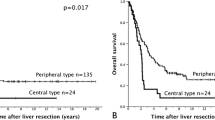Abstract
Background: Traditional teaching maintains that patients with primary colorectal adenocarcinoma require timely resection to prevent bleeding, perforation, or obstruction. The true benefits of primary tumor resection remain undocumented for patients presenting with metastatic disease, however. We postulated that resection of primary colorectal tumors could be avoided safely in a select population of asymptomatic colorectal cancer patients presenting with incurable stage IV disease.
Methods: A retrospective review of the Vanderbilt University Hospital tumor registry was performed for the years 1985 to 1997. During this period, 955 patients presented for management of primary colorectal cancer. From this group, all patients with stage IV disease at the time of diagnosis were identified. Patients who initially underwent resection of their primary lesion were included in the resection group; those who underwent initial nonoperative primary tumor management were included in the nonresection group. Data were obtained regarding age, extent of disease, nonsurgical therapy, tumor-specific complications, and palliative surgical procedures. Surgery-free survival and overall survival were analyzed using the Kaplan-Meier method. For patients with liver metastases, hepatic tumor burden was defined as either H1 (<25% parenchymal replacement), H2 (25% to 50%), or H3 (>50%) disease.
Results: Sixty-six patients were included in the resection group, and 23 patients with intact asymptomatic primary colorectal lesions were included in the nonresection group. Among patients with hepatic metastases, most of the patients in both groups had H1 disease. Ten patients in the resection group and 3 patients in the nonresection group presented with exclusively extrahepatic metastases. In the nonresection group, primary therapy included chemotherapy in 13 patients, external beam radiation therapy in 1 patient, and combination chemoradiation in 9 patients. The median survival in the nonresection group was 16.6 months. The 2-year actuarial survival was 18%, and the surgery-free survival was 91.3%. Only 2 of 23 patients (8.7%) managed without resection eventually developed obstruction at the primary tumor site requiring emergent diversion. There were no episodes of tumor-related hemorrhage or perforation. For the resection group, the operative morbidity was 30.3%, and the perioperative mortality rate was 4.6%. The median survival in the resection group was 14.5 months (P = 0.59, log-rank test vs. nonresection group).
Conclusions: Selected patients with asymptomatic primary colorectal tumors who present with incurable metastatic disease may safely avoid resection of their primary lesions, with an anticipated low rate of hemorrhage, perforation, or obstruction before death from systemic disease. No survival advantage is gained by resection of an asymptomatic primary lesion in the setting of incurable stage IV colorectal cancer.
Similar content being viewed by others
REFERENCES
American Cancer Society. 1998 Cancer Facts and Figures. Atlanta, American Cancer Society
Wood CB, Gillis CR, Blumgart LH. 1976 A retrospective study of the natural history of patients with liver metastases from colorectal cancer. Clin Oncol 2:285–288.
Griffin MR, Bergstralh MS, Coffey RJ, et al. 1987 Predictors of survival after curative resection of carcinoma of the colon and rectum. Cancer 60:2318–2324.
McGregor JR, O’Dwyer PJ. 1993 The surgical management of obstruction and perforation of the left colon. Surg Gynecol Obstet 177:203–208.
Serpell JW, McDermott FT, Katrivessis H, Hughes ES. 1989 Obstructing carcinomas of the colon. Br J Surg 76:965–969.
Piedbois P, Buyse M, Blijham G, et al. 1994 Meta-analysis of randomized trials testing the biochemical modulation of fluorouracil by methotrexate in metastatic colorectal cancer. J Clin Oncol 12:960–969.
Nordic Gastrointestinal Tumor Adjuvant Therapy Group. 1989 Sequential methotrexate/5-fluorouracil/leucovorin (MFL) is superior to 5-fluorouracil alone in advanced symptomatic colorectal carcinoma: A randomized trial. J Clin Oncol 7:1437–1446.
Nordic Gastrointestinal Tumor Adjuvant Therapy Group. 1992 Expectancy or primary chemotherapy in patients with advanced asymptomatic colorectal cancer: a randomized trial. J Clin Oncol 10:904–911.
Shimada Y, Rougier P, Pitot H. 1996 Efficacy of CPT-11 (Irinotecan) as a single agent in metastatic colorectal cancer. Eur J Cancer 32A(Suppl 3):S13–17.
Conti JA, Kemeny NE, Saltz LB, et al. 1996 Irinotecan is an active agent in untreated patients with metastatic colorectal cancer. J Clin Oncol 14:709–715.
Habeshaw T, Adam JS. 1982 Weekly large fraction radiotherapy and 5-fluorouracil as a palliative treatment for large bowel carcinoma: a pilot study. J Radiat Oncol Biol Phys 8:1127–1130.
O’Connell MJ, Childs DS, Moertel CG, et al. 1982 A prospective controlled evaluation of combined pelvic radiotherapy and methanol extraction residue of BCG (MER) for locally unresectable or recurrent rectal carcinoma. J Radiat Oncol Biol Phys 8:1115–1119.
Danjoux CE, Gelber RD, Catton GE, Klaassen DJ. 1984 Combination chemo-radiotherapy for residual, recurrent or inoperable carcinoma of the rectum: E.C.O.G Study (EST 3276). J Radiat Oncol Biol Phys 11:765–771.
Rominger CJ, Gelber RD. 1985 Radiation therapy alone or in combination with chemotherapy in the treatment of residual or inoperable carcinoma of the rectum and rectosigmoid or pelvic recurrence following colorectal surgery. Am J Clin Oncol (CCT) 8:118–127.
Bleday R, Breen E, Jessup JM, et al. 1997Prospective evaluation of local excision for small rectal cancers. Dis Colon Rectum 40:388–392.
Ota DM, Skibber J, Rich TAM.D. 1992 Anderson Cancer Center experience with local excision and multimodality therapy for rectal cancer. Surg Oncol Clin North Am 1:147–152.
Moran MR, Rothenberger DA, Lahr CJ, et al. 1987 Palliation for rectal cancer. Arch Surg 122:640–643.
Longo WE, Ballantyne GH, Bilchik AJ, Modlin IM. 1988Advanced rectal cancer. What is the best palliation? Dis Colon Rectum 31:842–847.
Eisenstat TE, Oliver GC. 1992 Electrocoagulation for adenocarcinoma of the low rectum. World J Surg 16:458–462.
Canon CL, Baron TH, Morgan DE, et al. 1997 Treatment of colonic obstruction with expandable metal stents: radiologic features. Am J Radiol 168:199–205.
Kiefhaber P, Kiefhaber K, Huber F. 1986 Preoperative neodymium- YAG laser treatment of obstructive colon cancer. Endoscopy 18 (suppl):44–46.
Daneker GW. 1991 Endoscopic laser recanalization is effective for prevention and treatment of obstruction in sigmoid and rectal cancer. Arch Surg 126:1348–1352.
Author information
Authors and Affiliations
Corresponding author
Rights and permissions
About this article
Cite this article
Scoggins, C.R., Meszoely, I.M., Blanke, C.D. et al. Nonoperative Management of Primary Colorectal Cancer in Patients With Stage IV Disease. Ann Surg Oncol 6, 651–657 (1999). https://doi.org/10.1007/s10434-999-0651-x
Received:
Accepted:
Issue Date:
DOI: https://doi.org/10.1007/s10434-999-0651-x




